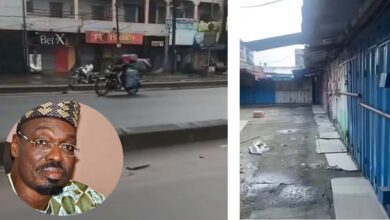Cameroon has been experiencing severe human rights violations, particularly in the English-speaking North West and South West regions. The Anglophone Crisis, which began as peaceful protests for educational and judicial reforms, has escalated into violent conflict, leading to mass arrests, extrajudicial killings, and widespread human rights abuses. Civilians, journalists, and activists advocating for justice face constant threats, persecution, and, in some cases, forced disappearances.
In this exclusive interview, Jato Noel Sangu, a dedicated human rights defender and volunteer with Human Is Right (HIR), sheds light on the crisis. Jato, who holds an MSc in Political Science and Public Administration from the University of Buea, has worked tirelessly to document and expose these atrocities. Here, he shares his experiences, challenges, and hopes for a peaceful resolution to the crisis.
Q&A with Jato Noel Sangu
Q1: Can you introduce yourself and your role at Human Is Right Cameroon?
Jato Sangu: I was a Protection Assistant at Human Is Right, responsible for identifying, investigating, documenting, and reporting human rights abuses in Cameroon’s South West region.
Q2: What motivated you to become a human rights advocate, particularly in the context of the Anglophone Crisis?
Jato Sangu: My motivation stems from personal experiences. Growing up in Cameroon, my school days and social life were filled with degrading and unjust experiences. Joining Human Is Right allowed me to contribute to improving human rights conditions for my peers and the Anglophone community at large.
Q3: What are the core objectives of Human Is Right, and how has your organization responded to the ongoing conflict?
Jato Sangu: Human Is Right Cameroon has consultative status with the United Nations ECOSOC and works closely with organizations like Cameroon’s Human Rights Commission, the U.S. Embassy, and the European Union Delegation. We expose illegal arrests, extrajudicial killings, and other human rights violations while advocating for freedom of speech and democracy.
The Anglophone Crisis & Human Rights Violations
Q4: How has the Anglophone Crisis evolved over the past few years, and what are the most urgent human rights concerns today?
Jato Sangu: The crisis has only worsened. There are increasing cases of unjustifiable killings, unlawful arrests, and disappearances. Dialogue attempts have failed to yield lasting solutions, leaving civilians trapped in a cycle of violence.
Q5: Can you share specific cases of human rights violations that Human Is Right has documented?
Jato Sangu: We have documented numerous cases, including mass killings of civilians, systematic torture of detainees, and forced disappearances. People are arrested arbitrarily, detained without trial, and subjected to inhumane treatment.
Q6: What challenges do civilians face in conflict zones regarding access to justice and basic human rights?
Jato Sangu: Civilians face severe restrictions on movement, justice, and daily life. The government has labeled many Anglophone areas as “black zones,” making it difficult for residents to access administrative services or legal recourse. The rule of law is virtually nonexistent.
Q7: How have security forces and armed groups contributed to the human rights crisis?
Jato Sangu: Both the government forces and separatist fighters have committed human rights violations. Security forces arrest, torture, and kill civilians indiscriminately, while armed groups impose strict controls, limiting freedom of movement and expression.
Q8: What risks do journalists, activists, and human rights defenders face?
Jato Sangu: Many face arbitrary arrest, detention, and even execution. The state uses intimidation tactics to suppress dissent and control narratives. Personally, I have been arrested, tortured, and labeled a traitor for standing up for human rights.
Legal Assistance & International Involvement
Q9: How effective is Cameroon’s legal system in addressing human rights violations?
Jato Sangu: The legal system in Cameroon is riddled with corruption and political influence. The judiciary is controlled by President Paul Biya, making fair trials nearly impossible. Victims have little to no chance of obtaining justice.
Q10: Have international sanctions or diplomatic interventions made an impact?
Jato Sangu: While some international organizations have pressured the government, their efforts have not been enough to stop the ongoing abuses. Stronger, more targeted sanctions could force the government into real dialogue.
Q11: Has Human Is Right been able to secure justice for any victims?
Jato Sangu: We have successfully secured bail and legal representation for some victims of unlawful detention, but the overall legal system remains oppressive.
The Future of the Anglophone Crisis
Q12: With the 2025 presidential election approaching, do you see any possibility for political change?
Jato Sangu: Realistically, no. The current regime has a tight grip on power, and any opposition faces severe repression. Without drastic international pressure, change is unlikely.
Q13: In your opinion, what must happen for a lasting resolution to the Anglophone conflict?
Jato Sangu: There are only two viable solutions: federalism or independence. The Cameroonian government must be pressured into genuine dialogue and structural reforms to grant more autonomy to the Anglophone regions.
Conclusion: The Anglophone Crisis & Hopes for the Future
The Anglophone Crisis remains one of the most pressing human rights issues in Africa today. The government’s harsh crackdowns, suppression of free speech, and violent military actions continue to fuel instability. At the same time, separatist fighters impose restrictions, making life unbearable for civilians caught in the middle.
Despite these challenges, activists like Jato Noel Sangu and organizations like Human Is Right continue to push for justice, documenting abuses and amplifying the voices of victims. Their efforts provide a glimmer of hope that, with enough international pressure and grassroots advocacy, a lasting solution may one day be found.
Until then, the struggle for human rights and dignity in Cameroon continues.
